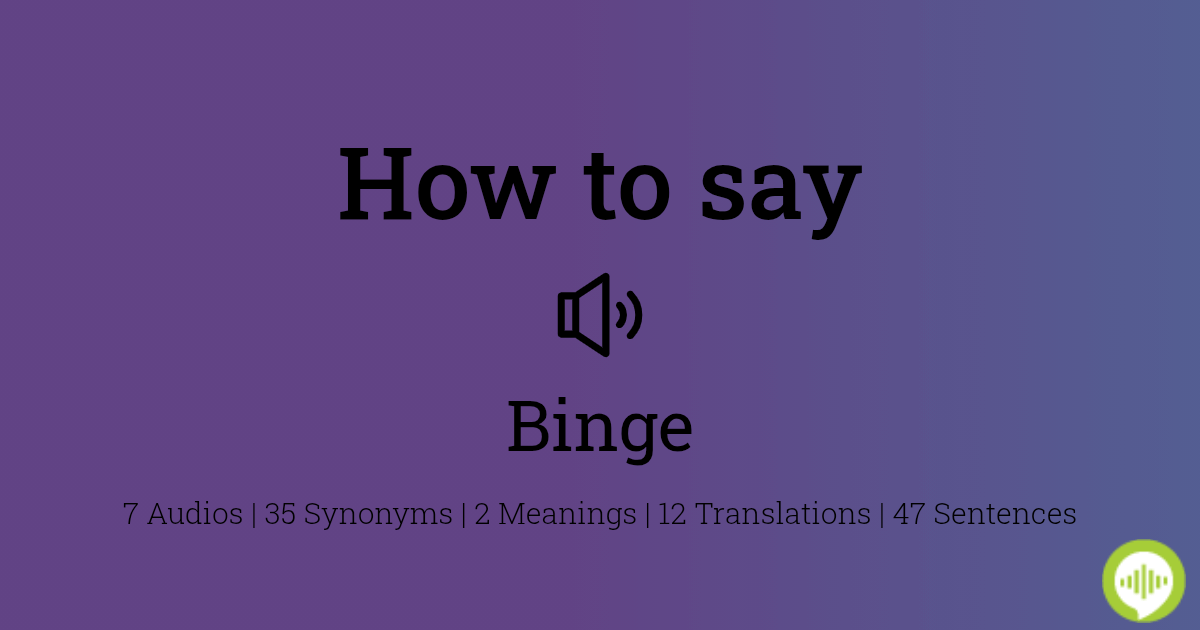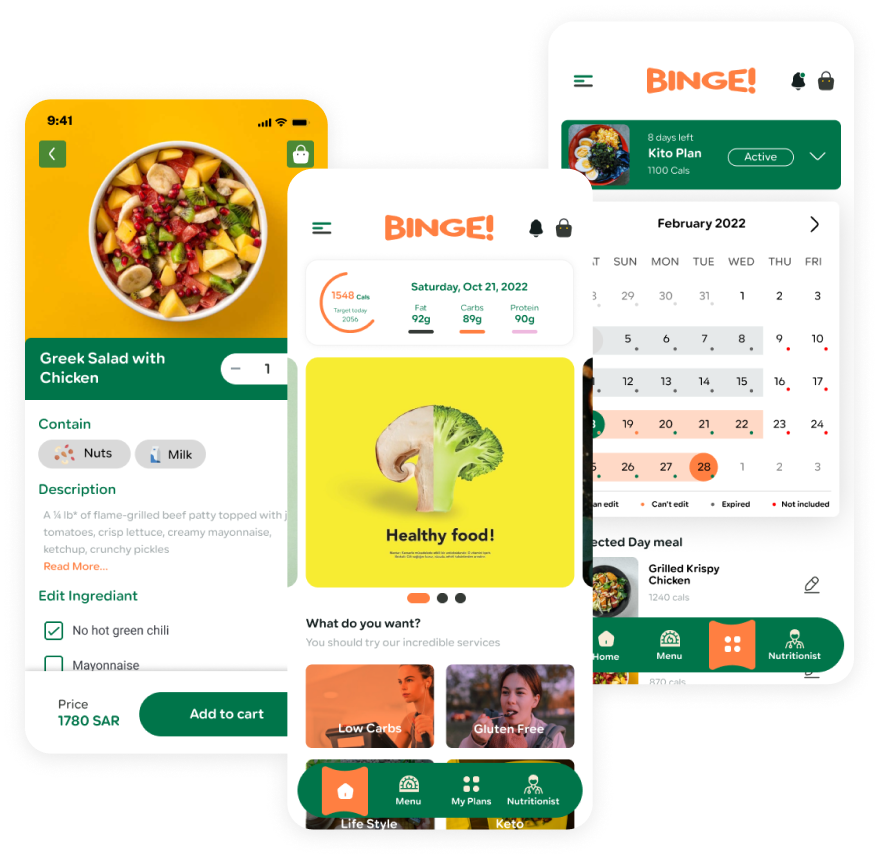Do you struggle with how to pronounce "binge"? Whether you're learning English as a second language or simply looking to refine your pronunciation skills, mastering the correct articulation of words like "binge" can significantly boost your confidence. This guide will walk you through everything you need to know about pronouncing "binge" correctly, breaking down its phonetic components and offering practical tips.
Pronunciation plays a crucial role in effective communication. Mispronouncing words can lead to misunderstandings, especially in professional or academic settings. Understanding the nuances of word pronunciation, such as "binge," ensures clarity and precision in your speech. In this article, we'll explore the phonetics of "binge," its origins, and how to pronounce it flawlessly.
Our goal is to provide you with a comprehensive resource that not only teaches you how to pronounce "binge" but also enhances your overall pronunciation skills. By the end of this article, you'll have the tools and knowledge to pronounce "binge" confidently and accurately.
Read also:Unlocking The Power Of Lube Match Shell Shell Oil Selector Your Ultimate Guide To Optimal Lubrication
Table of Contents
- Understanding the Phonetics of Binge
- The Origins of the Word Binge
- Step-by-Step Guide to Pronounce Binge
- Common Mistakes in Pronouncing Binge
- Practical Tips for Mastering Pronunciation
- Regional Variations in Pronouncing Binge
- Useful Tools for Learning Pronunciation
- How to Practice Pronunciation Effectively
- Why Pronunciation Matters
- Conclusion and Call to Action
Understanding the Phonetics of Binge
Phonetics is the study of speech sounds and their production, transmission, and perception. To pronounce "binge" correctly, it's essential to understand its phonetic components. The word "binge" is pronounced as /bɪndʒ/ in the International Phonetic Alphabet (IPA).
Breaking Down the Sounds
- /b/: A voiced bilabial stop. This sound is produced by closing both lips and releasing air explosively.
- /ɪ/: A short vowel sound, similar to the "i" in "sit." It's pronounced with the tongue positioned slightly forward in the mouth.
- /n/: A voiced alveolar nasal. This sound is made by lowering the soft palate and allowing air to pass through the nose.
- /dʒ/: A voiced palatal affricate. This sound combines a stop and a fricative, similar to the "j" in "jump."
By understanding these phonetic elements, you can break down "binge" into its constituent sounds and practice each one individually.
The Origins of the Word Binge
The word "binge" has an interesting etymology. It originated in the 19th century from the dialectal English word "bing," which meant "to soak or steep." Over time, "binge" evolved to describe excessive indulgence, particularly in eating, drinking, or other activities.
Historical Context
In the mid-1800s, "binge" began to be used in its modern sense to refer to a period of overindulgence. Its usage increased during the 20th century, especially with the rise of binge-watching and binge-drinking culture. Understanding the origins of "binge" provides valuable context for its pronunciation and usage.
Step-by-Step Guide to Pronounce Binge
Now that we've explored the phonetics and origins of "binge," let's dive into a step-by-step guide to help you pronounce it accurately.
Step 1: Start with the Initial Consonant
Begin with the /b/ sound. Close your lips tightly and release the air explosively to produce this voiced bilabial stop.
Read also:Unlocking The Secrets Of Ero Me Oorn A Deep Dive Into Trends Insights And Everything You Need To Know
Step 2: Add the Vowel Sound
Follow the /b/ sound with the short vowel /ɪ/. Position your tongue slightly forward in your mouth and keep your mouth slightly open.
Step 3: Incorporate the Nasal Sound
Next, add the /n/ sound by lowering your soft palate and allowing air to pass through your nose.
Step 4: Finish with the Affricate
Conclude with the /dʒ/ sound. Combine a stop and a fricative to create this voiced palatal affricate, similar to the "j" in "jump."
Common Mistakes in Pronouncing Binge
Even native English speakers can make mistakes when pronouncing "binge." Here are some common errors to avoid:
- Overemphasizing the Vowel: Some people stretch the /ɪ/ sound, making it sound like "binee." Stick to the short vowel sound for accuracy.
- Incorrect Final Consonant: Mispronouncing the /dʒ/ sound as a simple /d/ or /g/ can alter the word's meaning. Ensure you articulate the affricate clearly.
- Forgetting the Nasal Sound: Omitting the /n/ sound can result in "bidge" instead of "binge." Practice incorporating the nasal sound for correctness.
Awareness of these mistakes will help you refine your pronunciation and avoid common pitfalls.
Practical Tips for Mastering Pronunciation
Improving your pronunciation requires consistent practice and the right techniques. Here are some practical tips to help you master "binge" and other challenging words:
Tip 1: Listen to Native Speakers
Expose yourself to authentic pronunciation by listening to native English speakers. Podcasts, videos, and audiobooks are excellent resources for this purpose.
Tip 2: Record Yourself
Recording your own pronunciation allows you to identify areas for improvement. Compare your recording with that of a native speaker to pinpoint discrepancies.
Tip 3: Practice Regularly
Consistency is key when learning pronunciation. Set aside time each day to practice difficult words and sounds.
Regional Variations in Pronouncing Binge
English is spoken in many regions worldwide, and regional accents can influence pronunciation. While the standard pronunciation of "binge" is /bɪndʒ/, variations may exist depending on the speaker's accent.
British vs. American Pronunciation
In British English, the vowel sound /ɪ/ might be pronounced slightly longer, while American English tends to emphasize a shorter, sharper vowel. Both pronunciations are correct, so choose the one that aligns with your learning goals.
Useful Tools for Learning Pronunciation
Several tools and resources can aid your pronunciation learning journey:
- Online Dictionaries: Websites like Merriam-Webster and Oxford Learner's Dictionary offer audio clips of word pronunciations.
- Language Apps: Apps such as Duolingo and Babbel provide interactive exercises to improve pronunciation.
- Pronunciation Software: Programs like ELSA Speak and Speechling use AI to analyze and correct your pronunciation.
Utilizing these tools can enhance your learning experience and accelerate your progress.
How to Practice Pronunciation Effectively
Effective practice involves deliberate and focused effort. Here's how you can practice pronouncing "binge" and other words:
Shadowing Technique
Shadowing involves repeating what you hear in real-time. Listen to a native speaker pronounce "binge" and mimic their pronunciation as closely as possible.
Minimal Pair Exercises
Minimal pairs are words that differ by only one sound, such as "bin" and "binge." Practicing these pairs helps you distinguish subtle sound differences and improve your pronunciation.
Why Pronunciation Matters
Clear pronunciation is vital for effective communication. Mispronouncing words can lead to confusion or misinterpretation, especially in professional and academic settings. Mastering pronunciation not only enhances your language skills but also boosts your confidence in speaking English.
Professional Benefits
In the workplace, precise pronunciation ensures that your ideas are communicated clearly and professionally. It can also improve your credibility and authority in your field.
Conclusion and Call to Action
In conclusion, learning how to pronounce "binge" correctly involves understanding its phonetic components, practicing regularly, and utilizing available resources. By following the tips and techniques outlined in this guide, you can achieve flawless pronunciation and enhance your overall communication skills.
We invite you to take action by practicing the pronunciation of "binge" and sharing your progress with us in the comments below. Additionally, explore other articles on our site to further develop your English language skills. Together, let's make communication clear, confident, and effective!
References:
- Merriam-Webster Dictionary
- Oxford Learner's Dictionary
- Cambridge English Pronouncing Dictionary


